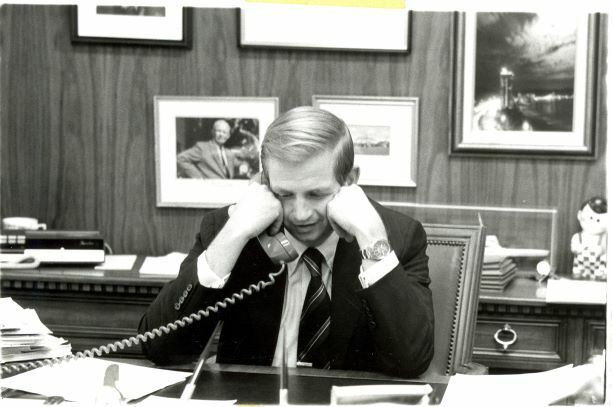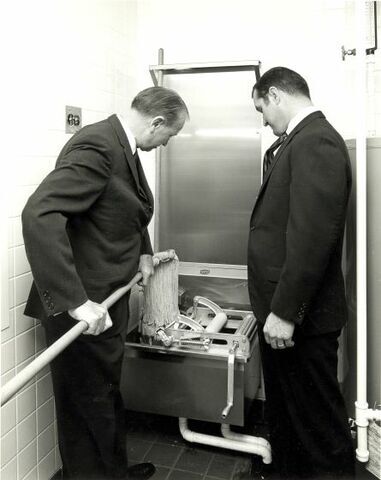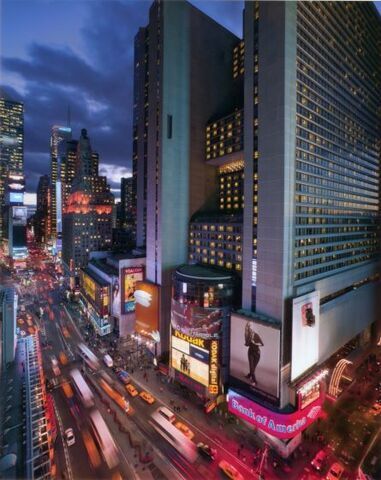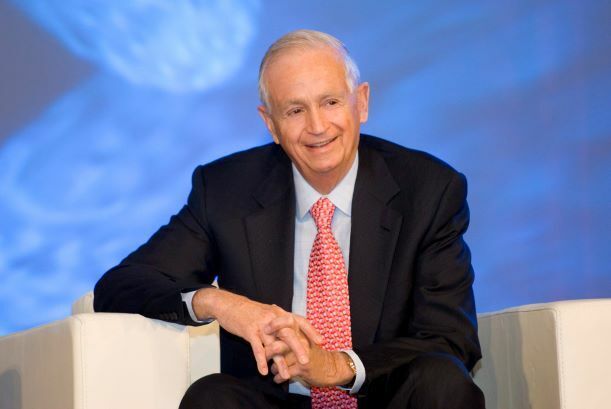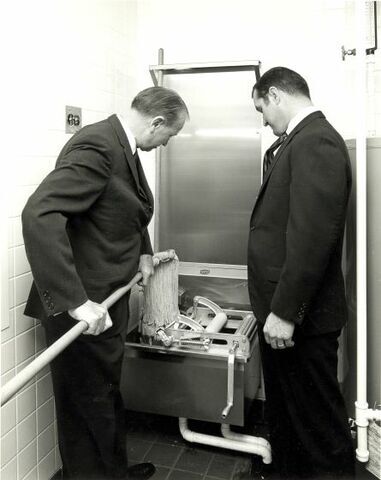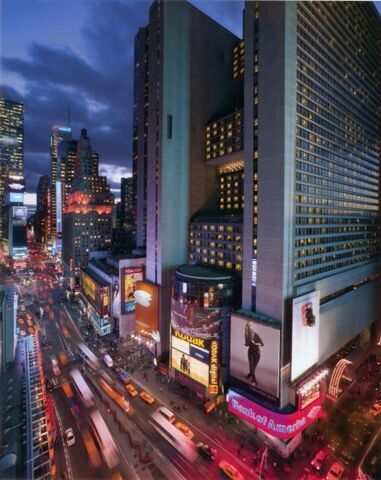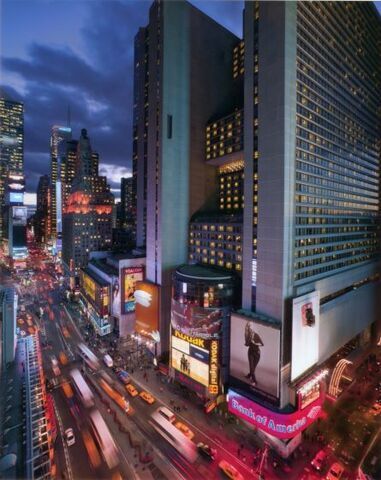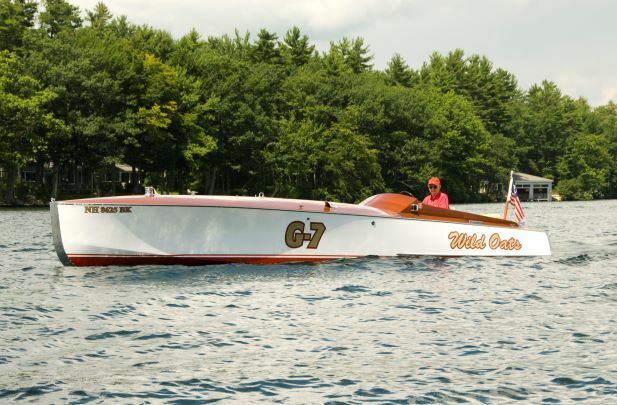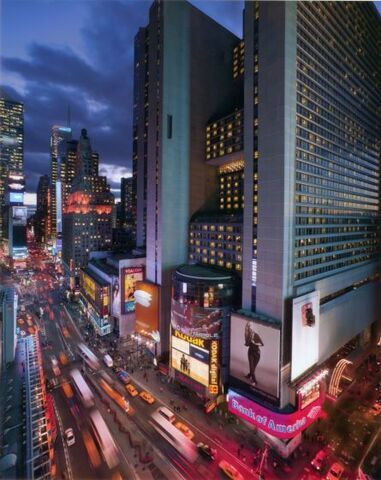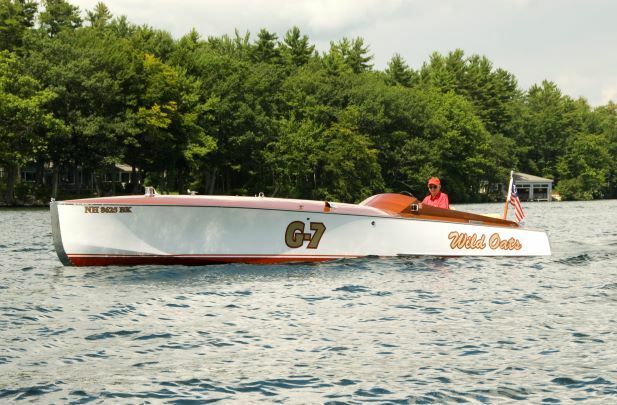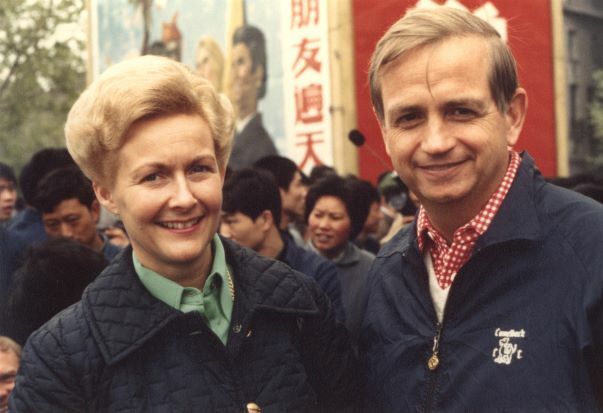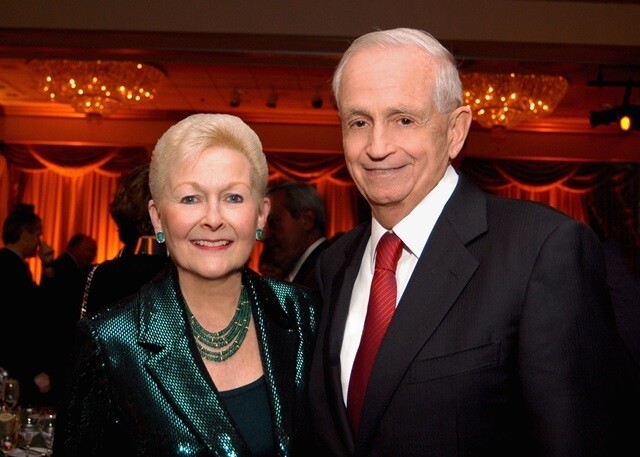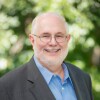No one on New Hampshire’s beautiful Lake Winnipesaukee could have suspected that the still air on a peaceful Saturday morning in 1985 might almost prove lethal for one of its most recognizable summer residents, Bill Marriott.
Bill’s father, J.W. Marriott, had died just 11 days earlier, and at his funeral in Washington, D.C., J.W. had been eulogized by former President Richard Nixon and evangelist Billy Graham. The audience had been filled with family, friends, and luminaries from government and business as well as leaders of The Church of Jesus Christ of Latter‑day Saints.
After the funeral, the Marriott clan gathered at their summer homes on the north side of Lake Winnipesaukee, their place of refuge since the 1940s. It was the only place 53-year-old Bill could truly relax, as his then-$3.5‑billion company, founded in 1927 by J.W. as a small root beer stand in Washington, D.C., now had 140,000 employees around the world. Branching out from his father’s restaurant empire, Bill had also built or bought 144 hotels and resorts, turning Marriott into the largest company-owned hotel chain in the United States and keeping Bill busier than ever.
"Get Out of the Boat"
The Latter‑day Saint community in Wolfeboro near the lake had been growing slowly over the years and had finally built its own chapel. Before J.W.’s death, Elder Boyd K. Packer, a close friend of the family, had promised J.W. that he would personally dedicate the chapel, so after speaking at J.W.’s funeral, Elder Packer joined the Marriott family at the lake on Friday, awaiting the Sunday dedication services.
Bill had promised Elder Packer a ride on his boat, a baby blue Donzi Express Cruiser, and after incessant daily winds had been whipping the lake into whitecaps, the calm Saturday seemed to be the perfect time to fulfill his promise.
After breakfast, Bill went down to his boathouse to prepare the Donzi. Refueling was routine for him, but the air was too still—there was no breeze to disperse the gas fumes, and the vapors dropped down into the boat around Bill’s legs. He did not smell the accumulation, nor did he know that the ignition switch was faulty. When he turned the power on to check the gas gauge, a spark ignited the gas. The explosion rattled windows up and down the lakeshore, and the flames enveloped Bill in a fraction of a second. Newspaper reports would claim that he was blown out of the boat, but for Bill, a miracle had occurred. In the midst of the conflagration, he heard a clear voice: “Get out of the boat!” Instead of being immobilized by shock, he had jumped into the lake.
Badly burned, Bill stumbled out of the water as his family rushed to help. At the hospital, Elder Packer gave him a priesthood blessing, promising that not only would Bill survive but that he would not be scarred. Elder Packer also boldly pronounced that the accident would have some divine purpose, as yet unknown.

Success Is Never Final
During the weeks of painful recovery, Bill had time to reflect on this life‑altering event. He already had a strong conviction about God, the healing sacrifice of Jesus Christ, and the truth of the Church that bore the Savior’s name. He knew without a doubt that he had been miraculously saved, that he was watched over from on high, and that he had an important place in the world and a mission that included his family, his friends, his church, and his larger family of Marriott employees. He had felt many of these things before, but this literal “refiner’s fire” had now etched it deep into his soul.
As he thought back over his life, he realized that many things about it had not been easy. Business for him had always been a fiery battlefield with competitors, price fluctuations, the labor market, government regulation, and the seesaw of the economy. Overarching that was the sometimes‑volatile relationship with his Depression‑era father, whose fear of debt led him to oppose many of the daring business decisions Bill had made to build the Marriott empire.

Though Bill couldn’t know it, there were also challenging years ahead that would include unbridled growth in the 1980s, a crippling recession that would nearly cost him his company, and the challenge of terrorism in a post‑9/11 world, not to mention the loss of two heroic employees on that terrible day when his Marriott hotel between the Twin Towers was obliterated. He also could not see that there would come a day when Marriott hotels would number more than 7,000, making Marriott the largest hotel management empire in the world. Despite all of the experiences he had already had and the ones he would face in the future, however, his motto was always to get back to work. Even as he spent months recovering from his accident, he never forgot the lesson he had learned from his father, that a life of ease is an enemy to progress. Bill knows that setbacks and challenges are the keys to success. He healed from his burns and moved forward, living by the motto his father often repeated: “Success is never final.”
Discovering the "Divine Purpose"
It would be another decade before Bill understood the blessing given to him by Elder Packer, that his burns would serve a “divine purpose.” In 1996, as a recognizable Latter‑day Saint, Bill was invited to add background to an interview of President Gordon B. Hinckley by CBS’s 60 Minutes reporter Mike Wallace. With Bill on camera, Wallace raised the sensitive topic of Latter‑day Saint temple garments. “Do you wear the sacred undergarments?” Wallace asked.
“Yes, I do,” replied Bill. “And I can tell you, they do protect you from harm.” He then related the story of the fire. “The boat was on fire. I was on fire. I was burned. My pants were burned right off me. I was not burned above my knee. Where the garment was, I was not burned. . . . My undergarments were not singed.” Though not everyone who wears garments has an outcome like Bill’s, the opportunity to share his experience caused him to think back on Elder Packer’s blessing. The terrible accident on the boat had allowed him to testify on national television about the tender mercies of God and the power of the priesthood.
However, there were other purposes for which his life had been spared, and the fire would not be the only time Bill responded to an angelic voice that saved his life.
"Get Off the Train"
In October of 1989, Bill was on his way from Washington to New York for a meeting of one of the many corporate boards on which he served. Rather than flying, he decided to take the train and catch up on his reading. Delayed by traffic getting to Washington’s Union Station, Bill was afraid he might miss the train, so he asked his driver to wait a few minutes at the curb, in case he needed to return. He had slept badly the night before due to some chest pains, and his chest was still burning as he settled into his seat on the Amtrak Metroliner. Then he heard a voice tell him, “Get off the train.” It was the same voice that had told him four years earlier to get off the boat. For the second time, Bill obeyed. His waiting driver raced him to the hospital, where tests showed Bill had experienced a heart attack. A cardiologist performed a balloon angioplasty that saved his life.
“I had been the walking stereotype of the workaholic executive—too little exercise and rest, too much work, and too many heavy dinners too late at night,” he says. It would not be his last heart attack, and the hardest work he put into each recovery was to not work too much. His empire was steadily growing with hotels, restaurants, airline catering, industrial cafeterias, commercial cleaning, senior living communities, amusement parks, and a cruise line. But his greatest work was always going on behind these lofty endeavors.
Mixing Religion and Business
In the background of Bill’s busy life as a CEO was his busy life as a Latter‑day Saint, husband, father, bishop, stake president, or Area Seventy.
Bill’s ready acceptance of the call to be bishop of the Chevy Chase, Maryland, ward in 1975 may have been his greatest act of faith. He was a globe‑trotting executive with the weight of a growing international corporation on his shoulders. In Bill’s father’s mind, the calling was so daunting for his son that, unbeknownst to Bill at the time, J.W. picked up the phone, called his friend President Spencer W. Kimball, and asked him to rescind the calling. President Kimball gently declined the request.
Bill responded to his new calling by delegating, organizing, and using his business skills at church to make sure the “ecclesiastical trains” ran on time. He also learned to tap into a well of compassion that was not commonly the forte of a corporate giant. The Chevy Chase Ward had a large contingent of Hispanic members whose Spanish‑speaking branch had been disbanded as they were absorbed into the heavily Anglo and affluent Chevy Chase congregation. The Hispanic members felt they had lost their footing, so Bill created a “translation booth,” from which English‑to‑Spanish translations of sermons were transmitted via headphones to the Spanish‑speakers seated in nearby pews. When one of them spoke from the pulpit, a simultaneous translation was piped into the chapel.
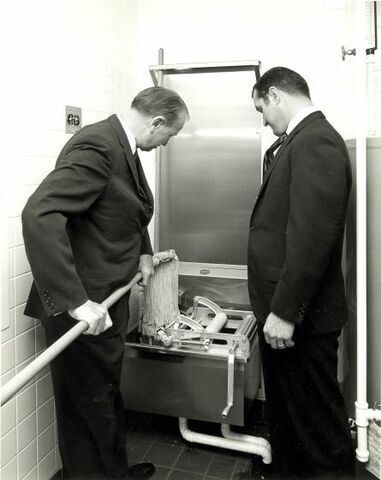
The devotion of those Hispanic members touched him, as many in abject poverty still paid tithing. “I had these . . . South American ladies come in and give me their tithes of $5 or $10, knowing that was maybe a full 10 percent of all they’d made in a week,” Bill recalls. “It brought me to a much better understanding of the minimum wage workers in my company, and I got a more empathetic feeling for them—the kind of lives they were leading, the problems they were having trying to raise their families. The faithfulness of those Hispanic tithe payers in my ward has always been an anchor to me in troubled times. No question about it.”
The family motto for Bill’s family was “no big shots,” and he was true to that as bishop as well as executive. He was often the last to leave after a ward social event, usually found with his family in the church kitchen doing dishes and mopping floors.
Finding "Lost Sheep"
Reactivating “lost sheep” was a priority for Bishop Marriott. It took more than a year to locate one inactive woman, but Bill finally learned that she was working in a local hospital. When he visited her there, she was aloof. But once she revealed an interest in music, Bishop Marriott asked her to join the ward choir. She began coming to church, gradually providing fellowship and service to others.
One man hadn’t been to church in 16 years when Bill finally located him. He was a heavy smoker, addicted to coffee, and enjoyed wine. He felt out of place attending ward meetings, but Bill kept showing up on the man’s doorstep and finally said to him, “If you have a cup of coffee or a cigarette, come to church anyway. We want you back.” The man did and was soon a regular member of the congregation again.
Bill learned to extend that same love and compassion to the active members of his ward. At the corporate office, Bill could say, “Do it!” and his staff would snap to attention. In his bishop’s office, he could say, “Do it. Do it. Do it,” and the task still might not get done. He finally realized, “We’ll just have to remember that we’re all volunteers. They don’t get paid for doing this. They’re doing it because they want to, and at the point they decide they don’t want to, you lose all control. We have to keep them wanting to.” Just as he had applied business skills in his calling as bishop to help keep the ward organized, he used what he learned in his calling to help his business. Keeping people wanting to do things was good for business. A CEO could extract success by being a bully and acting like a prima donna, but if he could get people to act out of desire, then success would more likely follow.
Blessings All Around
Perhaps only in the Church could a Fortune 500 CEO counsel with a neighbor about a deeply personal issue one night and then report to work and make multi‑million‑dollar decisions the next day.
“As bishop, I was dealing with every kind of thing imaginable—marital problems, kids on drugs, people in abject poverty who couldn’t get jobs,” Bill recalls. At first, he wore himself out in the effort. His wife, Donna, explains, “It took about six months before he realized there was no way he could solve all those problems. He wasn’t a trained psychologist. He was just one man. He decided he could do no more than the best he could, and pray that would suffice.”
Often Bill found ways to use his corporate and personal resources to help ward members in need. Once, he personally paid the airfare to send a young ward member back home to Salt Lake City for psychiatric treatment. The ward executive secretary was tasked with accompanying the young man. When they changed planes in Chicago, the airport was bedlam. Suddenly, a staffer from Bill’s airline catering business appeared out of nowhere on instructions from “the boss” and escorted the two men through security and onto their connecting flight.
The late business magnate and longtime friend of the Marriotts, Jon Huntsman, noted, “The happiest I’ve ever seen Bill was when he was bishop—when he was literally working around the clock with families who didn’t have anything. He seemed to thrive in that atmosphere. He radiated a sense of inner peace and contentment.”

Looking back on her husband’s time as bishop, Donna Marriott considers it nothing short of miraculous that Bill could fit it all in. “When he became bishop, I didn’t know where he would find the extra time he needed to do it, but the Lord blessed him to carry out his calling. We had a wonderful spirit in our home. He was able to do what needed to be done as bishop, still keep up with his job, and always be at home when he was needed.”
International Missionaries
Even with all of the blessings the Marriott family received, the time‑consuming calling could not help but sap some of his energy. “He had very, very long Sundays,” Donna recalls. “First there were the church meetings, and then he’d stay after church to counsel with people in his church office. After that, he’d make hospital visits or go to the members’ homes to talk with them. Then he’d go to work Monday morning just wrung out. People couldn’t understand why he was so tired on Monday. They’d all been out playing golf.”
Later, Bill spent five years as a counselor in the stake presidency and eight more years as president of the Washington D.C. Stake. After that, he served 15 years as an Area Seventy—at the time, the longest any man had held the calling. Church leadership often ran on meetings, and by the end of his service in these callings, Bill was a master at conducting them. He was never late. He always brought an agenda, and when the items were covered, the meeting was over.
In many respects, Bill was like any other member of the Church with a calling—toiling without monetary reward, juggling family crises and work, and dealing with frustration and setbacks. But unlike many others, his unique position as a titan of industry based in the US capital also allowed him and his family to make a difference in the global arena.

By management agreement, Bill has continued the requirement that every room in every Marriott managed hotel have a Book of Mormon on hand. And every time Marriott opened a new hotel overseas in countries where missionary visas were hard to get, Bill would make sure a general authority of the Church was there to greet the foreign dignitaries at the grand openings. For example, Elder D. Todd Christofferson credits the boost in Church‑Mexico relations to an introduction to Mexican President Ernesto Zedillo at the opening of a Marriott hotel in Mexico City. President Russell M. Nelson says that Bill helped pave the way for missionary work in every country where he planted a hotel. “[T]he Marriott name carried so much weight with these people,” says President Nelson. “They were doing cartwheels to get Marriott hotels in their countries, so when Bill hosted an activity, lending his name and his great faith to the Lord’s work, they came and they listened.”
A Legacy of Service
Bill’s father, J.W., began this family tradition of working to expand the Church in unique ways in the late 1960s, when he began lobbying Church leadership for a temple in Washington, D.C. The plan was derailed in 1968 by a string of violent riots in the capital sparked by the assassination of the Reverend Martin Luther King Jr., prompting Elder Harold B. Lee to decide that a temple would have to wait.
But J.W. was not finished. Two months after the upheaval, Church leaders asked him to consider moving to Salt Lake City to take an unspecified calling. Though the wily J.W. declined for health reasons, in the same breath he said he would be happy instead to donate $500,000 for a temple in Washington. Five months after that offer and seven months after the riots, President David O. McKay announced that the first temple built east of the Mississippi River since the Nauvoo Temple burned down in the 1840s would be in the nation’s capital. Bill hosted dignitaries at the temple open house and later lent his name and Rolodex to regular celebrations at the temple visitors’ center.
The Marriott family story is at once common and extraordinary. Now at age 87, Bill’s connections are still golden and his commitment to his faith and family unwavering, even as he has turned the day‑to‑day management of the Marriott empire over to others. He has never paused on any plateaus and probably never will, always driven by his personal conviction that success is never final.
Photos from Marriott International
This article originally ran in theJanuary/February 2020 issue, available on deseretbook.com.
Bill Marriott: Success Is Never Finalgives readers an intimate portrait of the life of this business titan and his definition of success. Bill shares details about his private struggles with his father's chronic harsh criticism; his innovations in the hotel industry; and the boundless passion and energy he demonstrated for his work, family, and faith. Bill also shares spiritual experiences that allowed him to recognize God's guidance in his personal life. Available now at Deseret Book stores and deseretbook.com.

